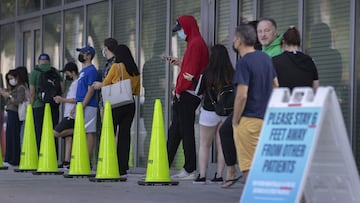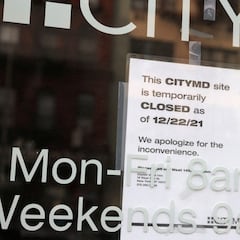How long is the covid-19 Omicron variant incubation period? How long does it last?
Just over a month since the first case of Omicron was detected it has been spreading even more rapidly than the Delta variant, here is what we know so far.

The latest variant of covid-19 Omicron is causing concern around the world with is rapid expansion. Discovered in testing samples in southern Africa in November it has already reached the four corners of the globe.
Given the newness of the strain, data is still very limited on the Omicron variant. But early real-world analysis gives some hope showing that symptoms appear to be less severe, but the variant is still lethal. Furthermore, the high rate of infections could overwhelm the healthcare systems across the nation strained by nearly two years of pandemic.
Also see:
- Covid-19 Omicron variant: live updates
- Businesses close as Omicron spreads quickly across the US
- Bill Gates makes statement on Omicron vaccines
- Can a PCR tell me which variant of covid-19 I have?
Omicron incubation period possibly faster than previous variants
Data on the Omicron variant is still very slim having only been discovered in a testing sample from Botswana 11 November. The first case was discovered in the US at the beginning of December and a CDC analysis of testing data has calculated that it could now make up over 70 percent of new cases. It has also claimed its first fatality in the US, an unvaccinated Houston-area man in his 50s who had underlying health conditions.
Symptoms may appear in three days or less as opposed to a week. However, according to Dr Anita Gupta, an anesthesiologist and critical care physician at the Johns Hopkins School of Medicine, several factors determine how long an incubation period could be saying “there is no hard and fast rule.”
Is Omicron more transmissible? Does it cause more severe disease? What are the symptoms and how can you protect yourself? Dr @mvankerkhove explains in #ScienceIn5 this week ⬇️ pic.twitter.com/RKqmgqzYhf
— World Health Organization (WHO) (@WHO) December 17, 2021
However, those who are fully vaccinated in general are experiencing less severe illness than the unvaccinated. Furthermore, those who have received a covid-19 vaccine booster are even less likely to be hospitalized. The CDC has recommended everyone 18 years and older get a booster shot 6 months after their second Pfizer or Moderna dose, or 2 months after receiving the single-dose Johnson and Johnson covid-19 vaccine.
The best defense against hospitalization is vaccination
Many people have qualms about getting vaccinated for any number of reasons and especially around the rapidity with which the covid-19 vaccines were developed. So far though, the vaccines that have been authorized for use in the US have proven effective and have only resulted in an extremely limited number of rare adverse events according to CDC data.
Vaccines are the strongest tool we have in the fight against COVID-19 and its dangerous variants. Head into winter with the highest level of protection: get vaccinated and boosted as soon as possible. pic.twitter.com/VLOxaPUZi8
— The White House (@WhiteHouse) December 22, 2021
Although breakthrough cases of people getting infected that are fully vaccinated have been reported, the chances of ending up in hospital are greatly reduced for those who are fully vaccinated, even more so for those who have gotten a booster.
Related stories
Covid-19, regardless of the strain, is sending those who are not vaccinated to hospital, five times more, and unfortunately the morgue, fifteen times more, according to the latest data on The New York Times covid-19 tracker.
Misinformation about the vaccines is awash on the internet from anti-vaxxers and has led people to attempt foolish cures for covid-19. Some of these like ivermectin have resulted in people being hospitalized for poisoning, and another like “BOO” or “magic dirt'”, a mud-like substance, contains dangerous levels of toxic heavy metals such as lead and arsenic.


